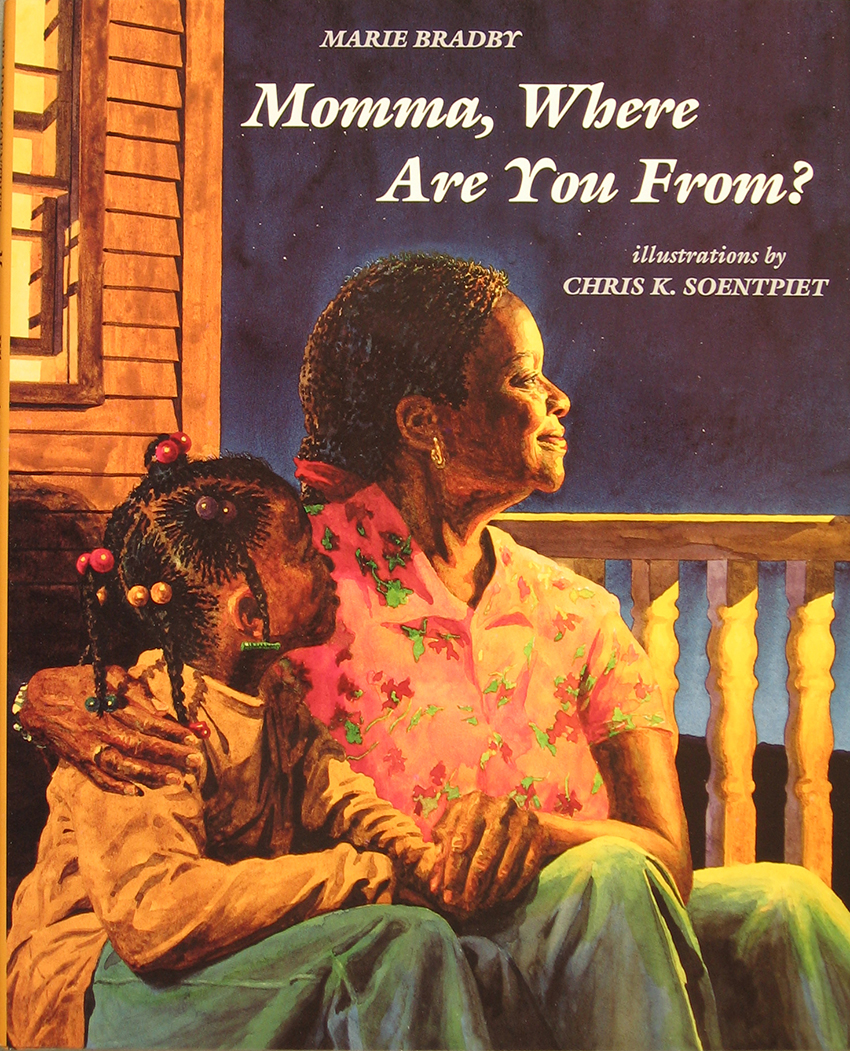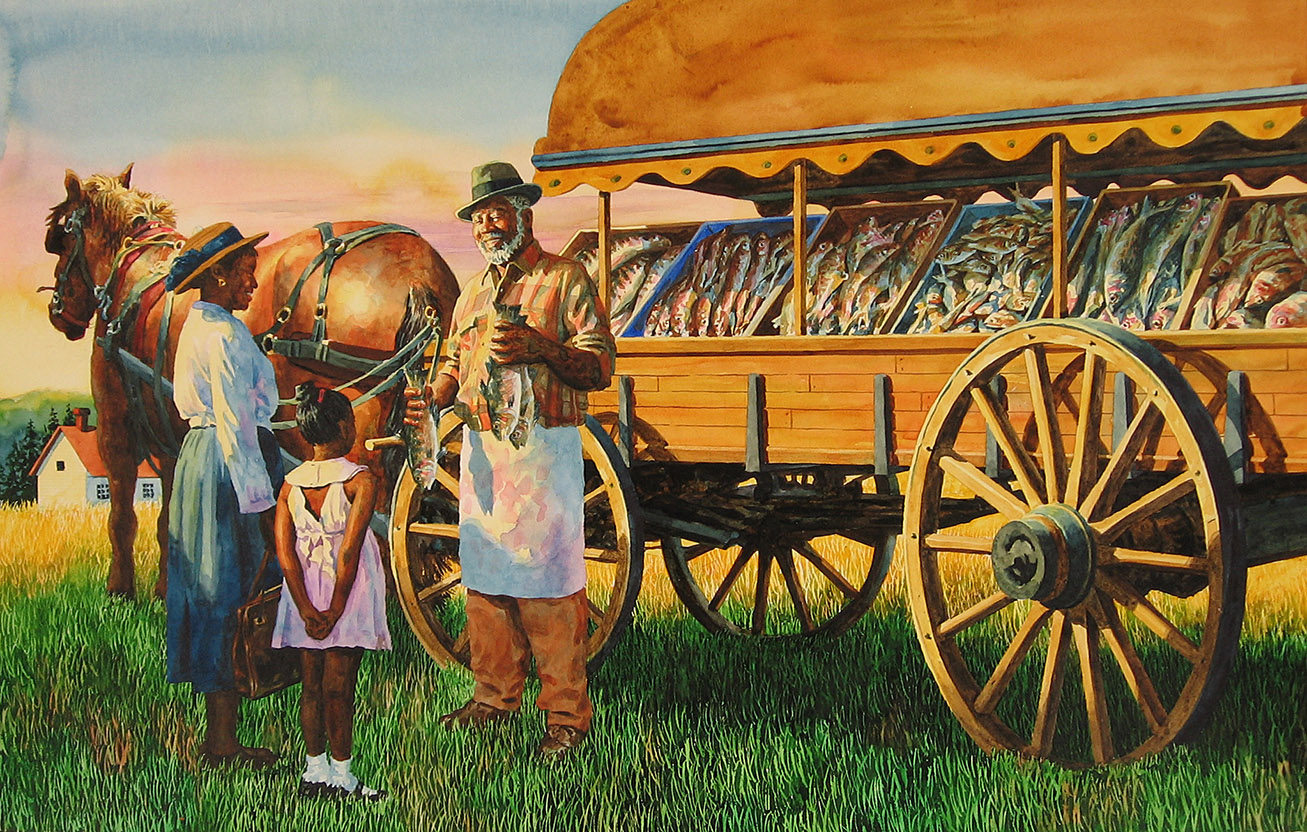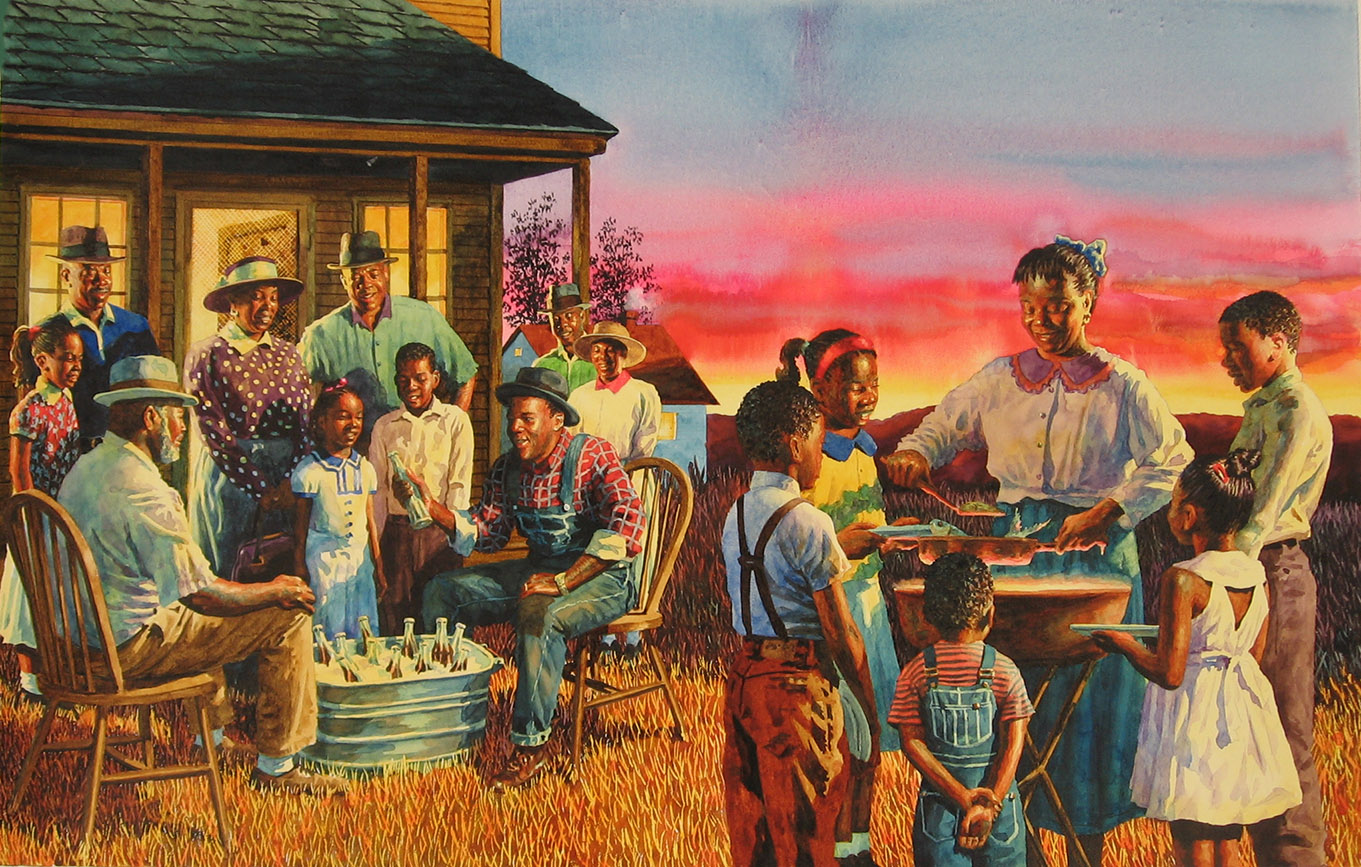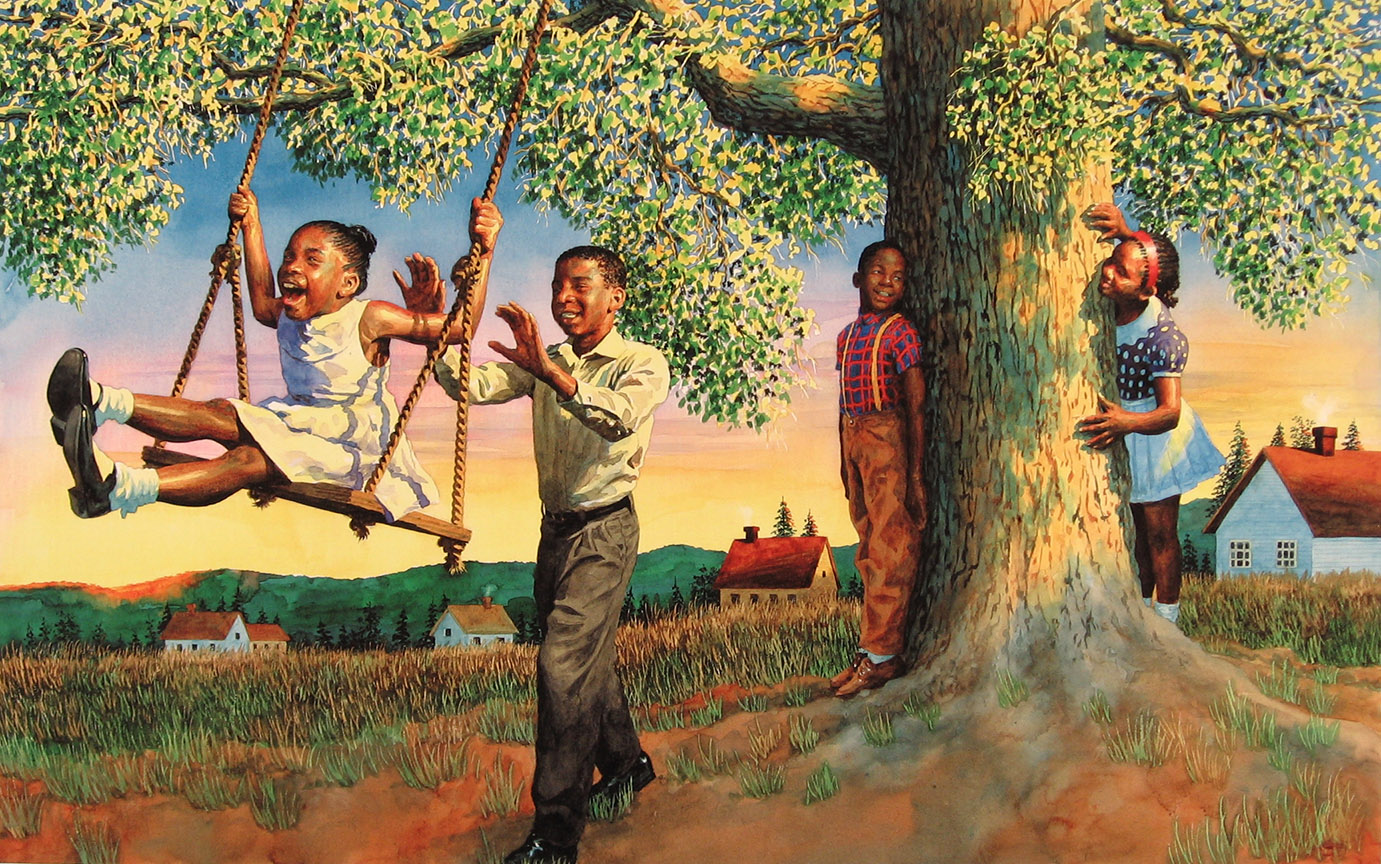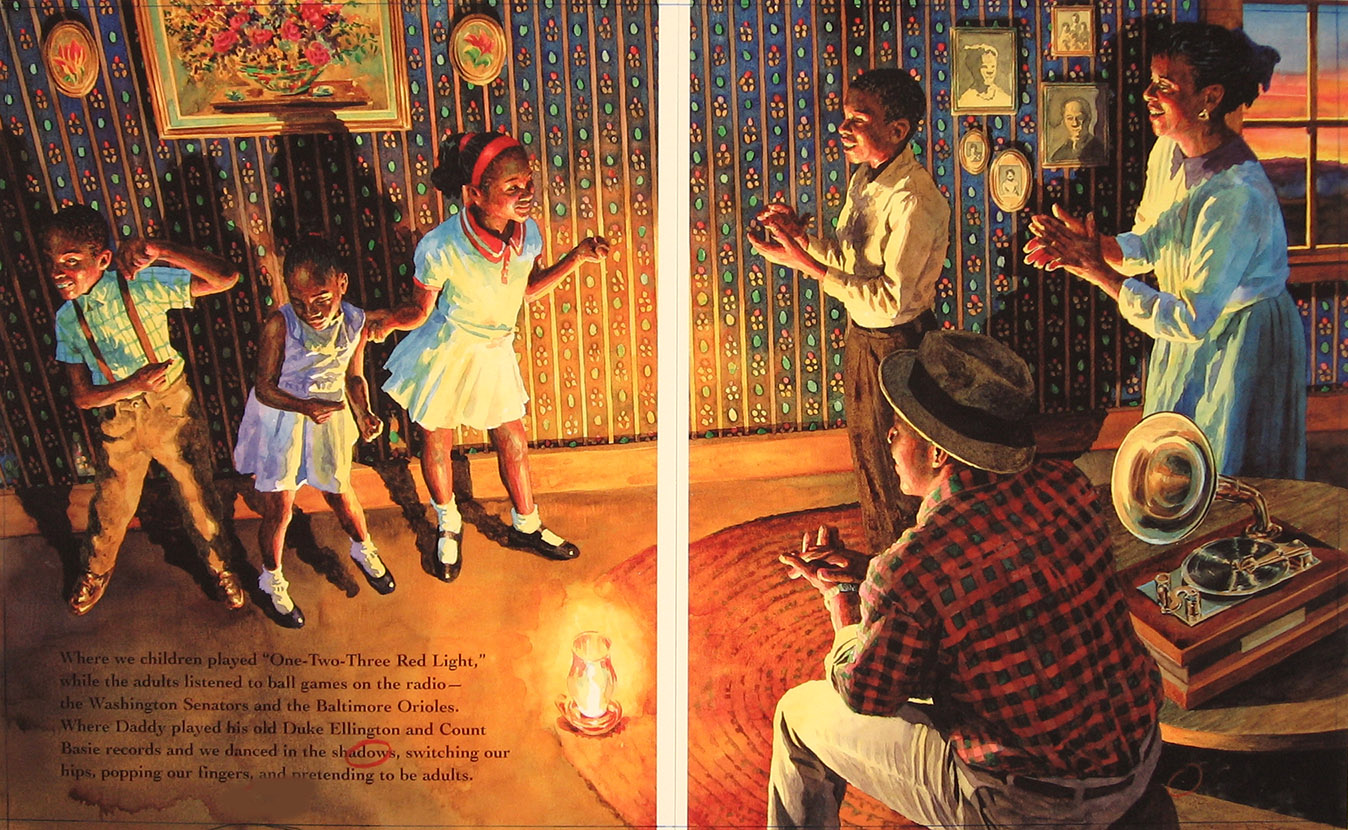Author:
Marie Bradby
Illustrator:
Chris K. Soentpiet
Gr K-3/Ages 5-8
32 pages
picture book
11½” X 9″
ISBN #0-531-30105-2
$16.95 US
$25.99 CAN
OrchardBooks imprint of:
Scholastic
555 Broadway
New York, NY 10012
(800) 724-6527
www.scholastic.com
Momma, Where Are You From?
Told with poetic detail and illustrated with exquisite watercolors, here is one mother’s unforgettable reply to her daughter’s question about her childhood. “I’m from Monday mornings washing loads of clothes in the wringer washer,” Momma begins. She recalls the cries of the fishman selling croakers, the tunes of Ellington and Basie, and the bus that carried her siblings way across town, past school…after school…after school, until it stopped at the school where all the students were brown-some light, some dark, and some in-between. To get where Momma comes from, you have to travel through the roads of memory. Here is your first-class ticket for the journey.
MY THOUGHTS ON ILLUSTRATING “MOMMA, WHERE ARE YOU FROM?”:
After the success of our previous book, More Than Anything Else, I jumped at the chance to collaborate with Marie Bradby again on her book Momma, Where Are You From? This wonderful book tells the story of a mother’s childhood memories with rhymes and playful text that will enrich African-American culture. – Chris Soentpiet
ABOUT THE AUTHOR:
 Children’s author Marie Bradby switched from a career as a full-time journalist to mothering, fiction writing, and free-lance writing. She has held staff reporting positions with The Providence-Journal (Rhode Island), The Lexington-Herald (Kentucky), and The Courier-Journal (Louisville, KY); and was a staff writer for National Geographic Magazine.
Children’s author Marie Bradby switched from a career as a full-time journalist to mothering, fiction writing, and free-lance writing. She has held staff reporting positions with The Providence-Journal (Rhode Island), The Lexington-Herald (Kentucky), and The Courier-Journal (Louisville, KY); and was a staff writer for National Geographic Magazine.
“The neighborhood where I grew up doesn’t exist any more. I wrote Momma, Where Are You From? to tell my son about a time and place where I grew up. The story highlights the things that would be different from today.” – Marie Bradby
Book Reviews:
“In answer to her daughter’s question, “Momma, where are you from?”, a woman answers indirectly by poetically evoking her own happily remembered childhood: “I’m from Monday mornings, washing loads of clothes in the wringer washer” Soentpiet’s bold, realistic watercolors depict small-town African-American life in what appears to be the ’40s or ’50s. They match the mother’s strong recollections of greeting the neighbors, ice-main, or fish-man; helping out with ironing and food preparation; and gathering the evening for fish fries and dancing to old Duke Ellington and Count Basie records. However, these memories also include the school bus taking her brothers and sisters way across town to schools “where all the children were brown-some light, some dark, some in between,” and living just past where the sidewalk ended. Glowing in her mother’s smile, the little girl asks if she can go there and is assured that they can travel in memories any time. While the time period of the mother’s childhood is unspecified but clearly not contemporary, the family’s love is always in evidence. In the illustrations, people’s faces radiate light and joy, and the interiors and clothing are rendered with loving details. This one’s a keeper.” – School Library Journal, April 2000
“In a large, bright kitchen, a mother is preparing dinner when her daughter asks the title question of this attractive picture book. The mother’s answer spills across the following pages in poetic remembrances: “I am from Monday mornings, washing loads of clothes in the wringer washer. I am from beans-green, lima, and pea-picked, strung, snapped, and shelled.” In few words, the mother describes segregated rural life in the past from a young black child’s point of view. Her remembrances of days filled with work, celebration, and the comings-and-goings of neighbors and peddlers are illustrated with pictures of a smiling, harmonious family. But all is not idealized; the mother also remembers her unanswered questions about why her neighbor cleaned other people’s houses, and why her siblings didn’t go to the school up the street. Soentpiet’s detailed, beautifully lit paintings freeze the mother’s vivid memories, culminating in a dreamy, gray-toned montage of all the previous scenes. Children will be inspired by the mother’s eloquent, proud answer to her daughter’s essential question.” – BookList Review, February 2000
“In this lyrical picture book, an African-American mother tells her young daughter about growing up in the rural South in a time long ago. The story and illustrations are evocative, leaving only the historical time in question; if the question of the title is posed now, the mother’s memories seem drawn more from her own mother’s-or-grandmother’s-era. Nevertheless, these are charming memories from the collaborators behind More Than Anything Else” – Kirkus Reviews, January 2000
Awards
- Peggy Sharp, Ed.D Pick 2000
- North Carolina Children’s Book Award
- Golden Kite Award Honor 2000


